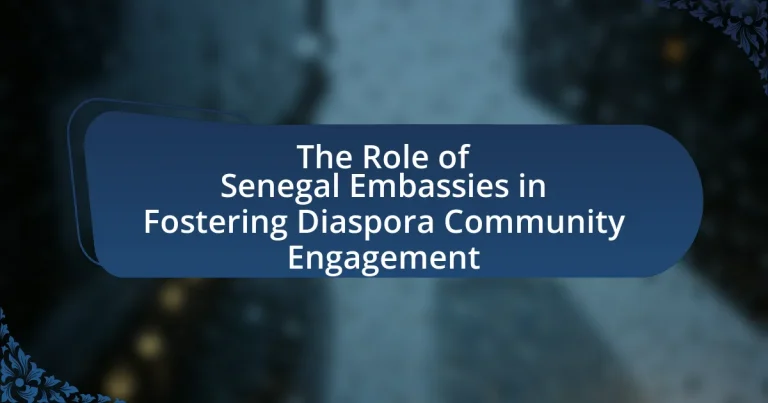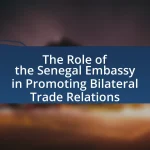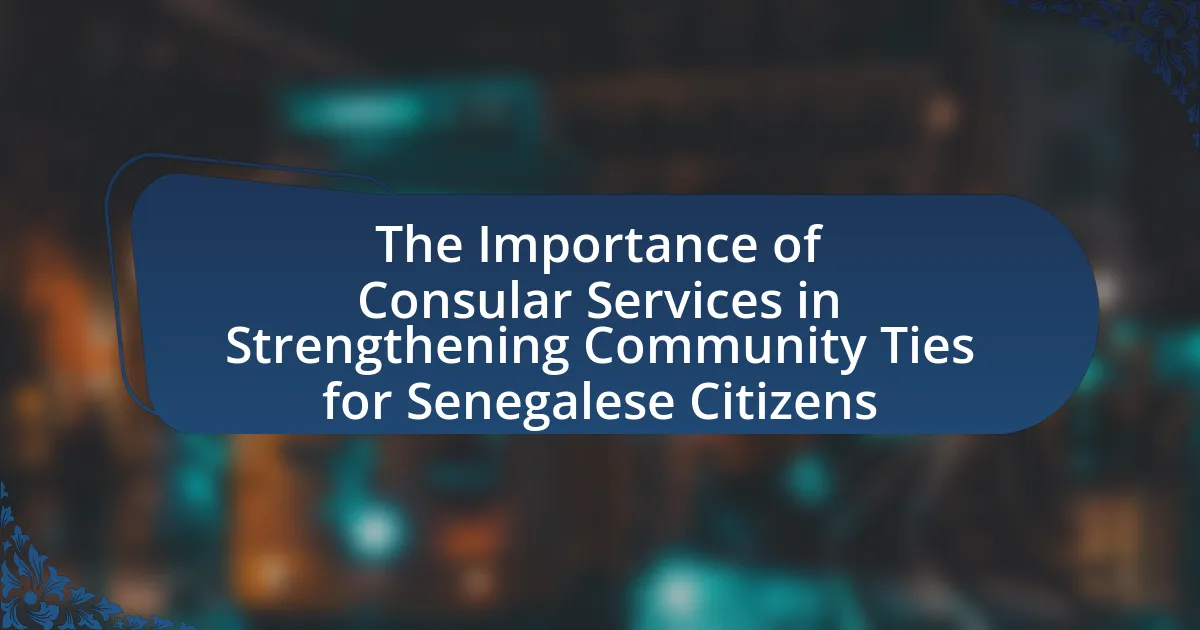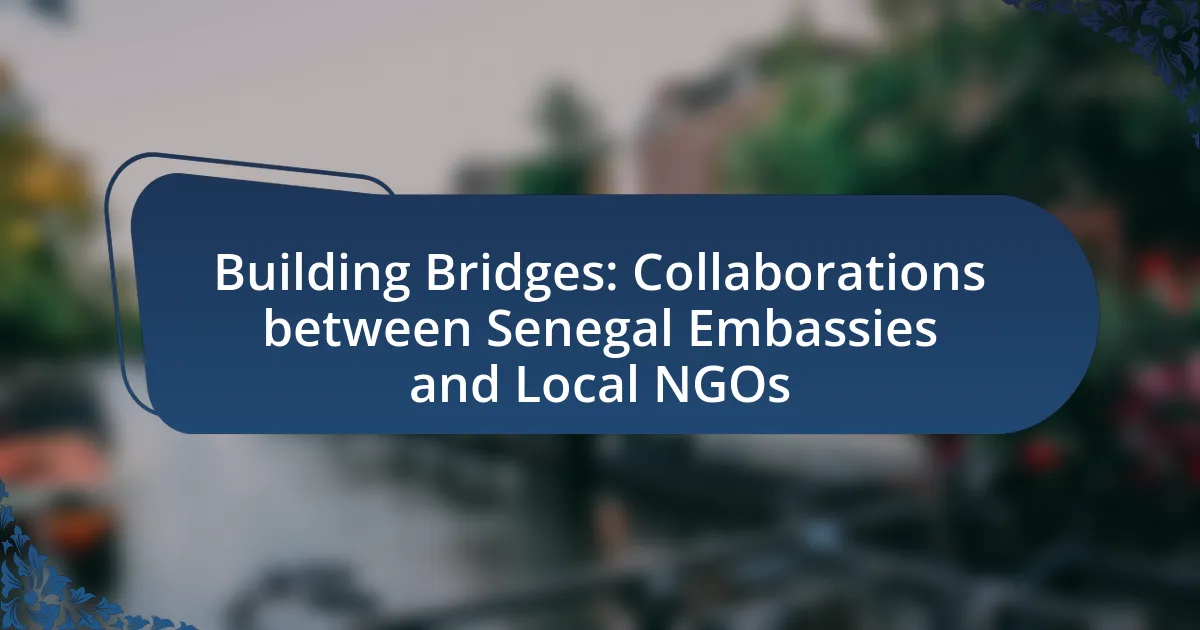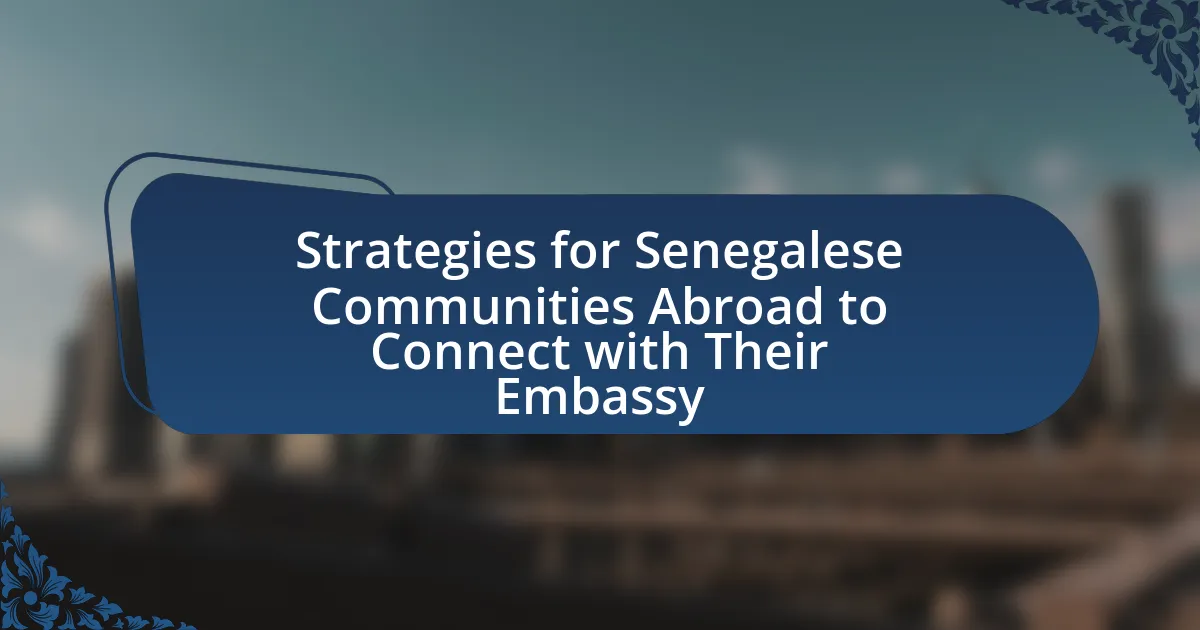Senegal embassies play a vital role in fostering engagement within the Senegalese diaspora by acting as a link between the government and its citizens abroad. They provide essential services, organize cultural events, and implement programs aimed at maintaining cultural identity and promoting economic ties. Key initiatives include the Diaspora Investment Fund and various cultural exchange programs that enhance community cohesion and support national development. Additionally, embassies face challenges such as limited resources and communication barriers, which impact their effectiveness in engaging the diaspora. Overall, the engagement of Senegal embassies is crucial for strengthening ties between Senegal and its expatriates, facilitating economic contributions, and preserving cultural heritage.
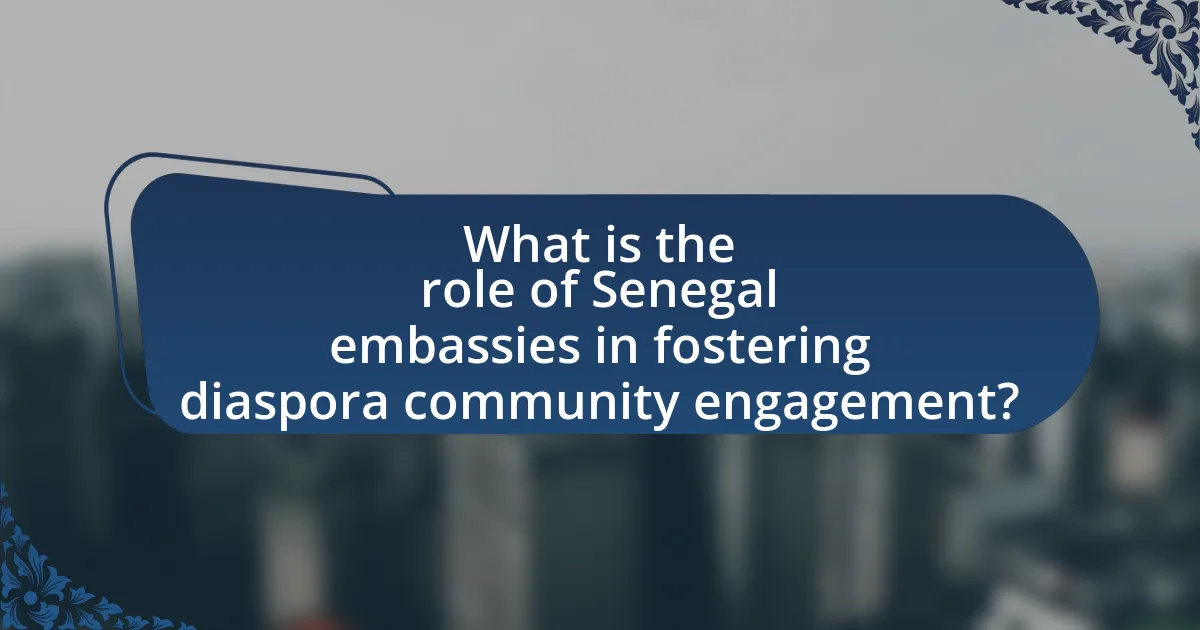
What is the role of Senegal embassies in fostering diaspora community engagement?
Senegal embassies play a crucial role in fostering diaspora community engagement by serving as a bridge between the Senegalese government and its citizens living abroad. They facilitate communication, provide resources, and organize events that promote cultural identity and community cohesion among Senegalese expatriates. For instance, embassies often host cultural festivals, networking events, and informational sessions that encourage participation and collaboration within the diaspora. Additionally, they assist in addressing the needs and concerns of Senegalese nationals, such as legal assistance and social services, thereby strengthening ties to their homeland. This engagement is vital for maintaining cultural heritage and supporting the socio-economic development of Senegal through diaspora contributions.
How do Senegal embassies support their diaspora communities?
Senegal embassies support their diaspora communities by providing essential services such as legal assistance, facilitating the repatriation of citizens, and promoting cultural and economic ties. These embassies serve as a bridge between the Senegalese government and its citizens abroad, offering guidance on immigration issues and access to social services. For instance, they organize events that celebrate Senegalese culture, which helps maintain cultural identity among the diaspora. Additionally, embassies often collaborate with local organizations to create networking opportunities that enhance economic engagement, thereby fostering a sense of community and belonging among Senegalese expatriates.
What specific programs do Senegal embassies implement for diaspora engagement?
Senegal embassies implement several specific programs for diaspora engagement, including the “Diaspora Investment Fund,” which encourages financial contributions from Senegalese abroad to support local development projects. Additionally, they organize “Cultural Exchange Programs” that promote Senegalese culture and heritage among the diaspora, fostering a sense of community and identity. The embassies also facilitate “Networking Events” that connect Senegalese professionals globally, enhancing collaboration and opportunities for business and cultural exchange. These initiatives are designed to strengthen ties between Senegal and its diaspora, ensuring active participation in national development.
How do embassies facilitate communication between the diaspora and Senegal?
Embassies facilitate communication between the diaspora and Senegal by serving as official channels for information exchange and support. They provide essential services such as consular assistance, which includes helping citizens with legal matters, documentation, and emergency situations. Additionally, embassies organize cultural events and community outreach programs that connect Senegalese nationals abroad with their home country, fostering a sense of belonging and engagement. For instance, the Senegalese embassy in Paris regularly hosts events that promote Senegalese culture and heritage, thereby strengthening ties between the diaspora and Senegal.
Why is diaspora community engagement important for Senegal?
Diaspora community engagement is important for Senegal because it strengthens economic ties and fosters cultural exchange. The Senegalese diaspora contributes significantly to the national economy through remittances, which amounted to approximately $2.4 billion in 2020, representing about 10% of the country’s GDP. Additionally, engaging the diaspora helps preserve Senegalese culture and identity abroad, facilitating the transfer of knowledge and skills back to Senegal. This engagement also enhances political representation and advocacy for Senegalese interests on a global scale, ensuring that the voices of citizens abroad are heard in national discussions.
What are the benefits of a strong diaspora community for Senegal?
A strong diaspora community benefits Senegal by enhancing economic development through remittances, which accounted for approximately 11% of the country’s GDP in 2021. This financial support from Senegalese abroad helps to alleviate poverty and stimulate local economies. Additionally, a robust diaspora fosters cultural exchange and promotes Senegalese identity globally, strengthening national pride and unity. Furthermore, the diaspora can facilitate knowledge transfer and investment opportunities, as many members possess skills and resources that can contribute to Senegal’s growth. These factors collectively underscore the significant advantages a strong diaspora community brings to Senegal.
How does diaspora engagement contribute to national development?
Diaspora engagement contributes to national development by facilitating financial remittances, knowledge transfer, and investment opportunities. Financial remittances from the diaspora significantly boost the economy; for instance, in Senegal, remittances accounted for approximately 10% of the GDP in 2020, providing essential support for families and local businesses. Additionally, diaspora members often share expertise and skills acquired abroad, enhancing local capacities in various sectors such as education, healthcare, and technology. Furthermore, diaspora engagement can attract foreign direct investment, as expatriates are more likely to invest in their home country due to established networks and trust. This multifaceted contribution underscores the vital role of diaspora communities in driving national development initiatives.
What challenges do Senegal embassies face in engaging the diaspora?
Senegal embassies face several challenges in engaging the diaspora, primarily including limited resources, communication barriers, and varying levels of interest among diaspora communities. Limited resources hinder the embassies’ ability to organize events and outreach programs effectively, which diminishes their capacity to connect with Senegalese citizens abroad. Communication barriers arise from language differences and cultural misunderstandings, making it difficult for embassies to convey their messages and services clearly. Additionally, the varying levels of interest among diaspora communities can lead to inconsistent engagement, as some individuals may prioritize their local circumstances over involvement with the embassy. These challenges collectively impede the embassies’ efforts to foster a strong and active diaspora community.
What are the common barriers to effective communication with the diaspora?
Common barriers to effective communication with the diaspora include language differences, cultural misunderstandings, and limited access to technology. Language differences can hinder clear messaging, as not all diaspora members may be fluent in the official language used by embassies. Cultural misunderstandings arise when communication styles and norms differ, leading to misinterpretations of intent or meaning. Limited access to technology can restrict the diaspora’s ability to receive information or engage with embassy services, particularly in regions with poor internet connectivity. These barriers can significantly impede the effectiveness of outreach efforts by Senegal embassies in fostering community engagement.
How do political and social factors impact embassy-diaspora relations?
Political and social factors significantly impact embassy-diaspora relations by shaping the communication, support, and engagement strategies employed by embassies. For instance, political stability in Senegal encourages embassies to foster stronger ties with the diaspora through initiatives that promote investment and cultural exchange, while political unrest can lead to a withdrawal of support and communication, creating a disconnect. Social factors, such as the diaspora’s integration into host countries and their cultural identity, influence how embassies tailor their outreach programs, ensuring they resonate with the community’s needs and aspirations. Evidence of this can be seen in Senegal’s diaspora policies, which have evolved to include consultations with diaspora representatives, reflecting their social and political concerns, thereby enhancing the effectiveness of embassy-diaspora relations.
How do Senegal embassies collaborate with local organizations to enhance diaspora engagement?
Senegal embassies collaborate with local organizations by establishing partnerships that facilitate communication and resource sharing to enhance diaspora engagement. These collaborations often involve organizing cultural events, workshops, and informational sessions that promote Senegalese heritage and provide support for the diaspora community. For instance, embassies may work with local cultural associations to host events that celebrate Senegalese festivals, thereby fostering a sense of community among expatriates. Additionally, embassies often provide resources and guidance to local organizations that assist Senegalese nationals in navigating legal and social services in their host countries, which further strengthens the connection between the diaspora and their homeland.
What types of partnerships are formed between embassies and local organizations?
Embassies form various types of partnerships with local organizations, primarily focusing on cultural exchange, economic development, and community support. Cultural exchange partnerships often involve organizing events that promote Senegalese culture, such as art exhibitions, music festivals, and culinary showcases, which help strengthen ties between the diaspora and local communities. Economic development partnerships may include collaborations with local businesses to facilitate trade, investment opportunities, and entrepreneurship programs aimed at empowering the diaspora. Additionally, embassies engage in community support partnerships by working with local NGOs to address social issues, provide educational resources, and enhance public health initiatives, thereby fostering a sense of belonging and engagement among Senegalese nationals abroad.
How do these collaborations benefit the diaspora community?
Collaborations between Senegal embassies and the diaspora community enhance cultural exchange and economic development. These partnerships facilitate access to resources, information, and support systems that empower diaspora members to engage with their heritage while contributing to their host countries. For instance, initiatives such as networking events and cultural festivals organized by embassies promote Senegalese culture and strengthen community ties, leading to increased participation in local economies. Additionally, these collaborations often result in educational programs and workshops that provide diaspora individuals with skills and knowledge beneficial for personal and professional growth, thereby fostering a sense of belonging and identity.
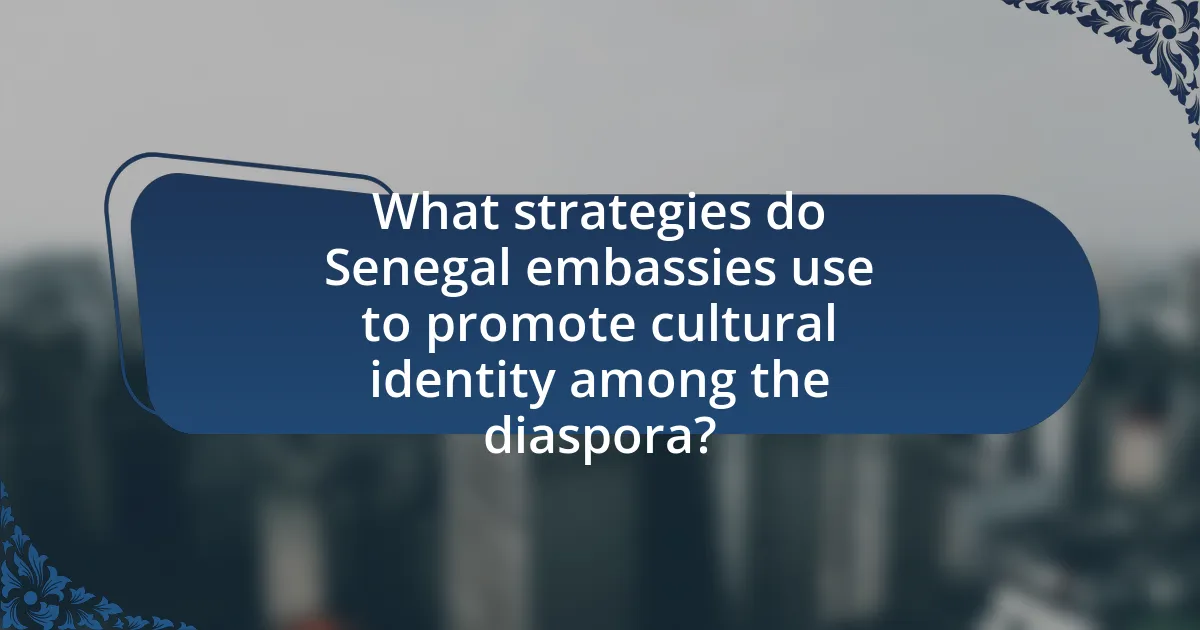
What strategies do Senegal embassies use to promote cultural identity among the diaspora?
Senegal embassies promote cultural identity among the diaspora through various strategies, including organizing cultural events, providing educational resources, and facilitating community engagement initiatives. These embassies host festivals, art exhibitions, and workshops that celebrate Senegalese traditions, music, and cuisine, thereby fostering a sense of belonging and cultural pride among Senegalese expatriates. Additionally, they offer language classes and cultural seminars to help the diaspora maintain their linguistic and cultural heritage. By collaborating with local organizations and Senegalese community groups, embassies create platforms for dialogue and networking, reinforcing cultural ties and identity.
How do embassies organize cultural events for the diaspora?
Embassies organize cultural events for the diaspora by collaborating with local organizations, leveraging community input, and utilizing cultural resources from their home country. This process often involves identifying the interests and needs of the diaspora community, which helps embassies tailor events such as festivals, art exhibitions, and educational workshops to foster engagement. For instance, Senegalese embassies frequently host events that celebrate traditional music, cuisine, and art, thereby strengthening cultural ties and promoting national identity among Senegalese expatriates. These initiatives not only enhance community cohesion but also serve as platforms for networking and cultural exchange, reinforcing the embassies’ role in supporting their diaspora.
What types of cultural events are most popular among the Senegalese diaspora?
Cultural events that are most popular among the Senegalese diaspora include music festivals, traditional dance performances, and culinary fairs. These events serve as vital platforms for the diaspora to celebrate their heritage, connect with their roots, and foster community ties. For instance, music festivals often feature genres like mbalax, which is integral to Senegalese culture, allowing participants to engage with familiar sounds and rhythms. Additionally, traditional dance performances showcase cultural expressions that resonate deeply with the Senegalese identity. Culinary fairs highlight Senegalese cuisine, offering dishes such as thieboudienne, which not only satisfy nostalgic cravings but also promote cultural exchange. These events are essential for maintaining cultural continuity and strengthening the bonds within the diaspora community.
How do these events strengthen community ties within the diaspora?
Events organized by Senegal embassies strengthen community ties within the diaspora by providing a platform for cultural exchange and networking. These gatherings foster a sense of belonging and identity among Senegalese expatriates, allowing them to connect with their heritage and each other. For instance, cultural festivals and national celebrations encourage participation and collaboration, reinforcing social bonds. Additionally, these events often include discussions on community issues, which promote collective action and support networks, enhancing the overall cohesion of the diaspora community.
What role does education play in diaspora engagement by Senegal embassies?
Education plays a crucial role in diaspora engagement by Senegal embassies by facilitating knowledge transfer and cultural exchange. Senegal embassies implement educational programs and initiatives that connect the diaspora with their homeland, promoting awareness of Senegalese culture, language, and values. For instance, initiatives such as scholarships for Senegalese students abroad and educational workshops help strengthen ties between the diaspora and Senegal. These efforts not only enhance the diaspora’s understanding of their roots but also encourage active participation in national development projects, thereby fostering a sense of belonging and community among Senegalese abroad.
How do embassies support educational initiatives for the diaspora?
Embassies support educational initiatives for the diaspora by facilitating access to scholarships, educational resources, and cultural exchange programs. For instance, Senegalese embassies often collaborate with local educational institutions to promote scholarship opportunities specifically for Senegalese students abroad, enhancing their academic prospects. Additionally, embassies may organize workshops and seminars that focus on the educational needs of the diaspora, thereby fostering a sense of community and cultural identity. These initiatives are crucial in maintaining connections between the diaspora and their home country, ensuring that educational opportunities are accessible and relevant.
What resources are available for Senegalese students abroad?
Senegalese students abroad have access to various resources provided by Senegalese embassies and consulates, including academic support, cultural programs, and networking opportunities. These embassies often facilitate scholarships, offer guidance on local educational institutions, and assist with legal and administrative matters related to studying in foreign countries. Additionally, they organize events that promote Senegalese culture and foster connections among students, enhancing their sense of community and belonging while abroad.
How do Senegal embassies utilize technology to enhance diaspora engagement?
Senegal embassies utilize technology to enhance diaspora engagement by implementing digital communication platforms and social media outreach. These embassies leverage tools such as websites, mobile applications, and social media channels to provide timely information, facilitate virtual events, and foster community connections among Senegalese citizens abroad. For instance, the Senegalese government has developed online portals that allow diaspora members to access consular services, participate in cultural events, and engage in discussions about national issues, thereby strengthening their ties to their home country.
What digital platforms are used for communication with the diaspora?
Digital platforms used for communication with the diaspora include social media networks, email newsletters, and dedicated mobile applications. Social media platforms like Facebook, Twitter, and Instagram facilitate real-time interaction and information sharing among diaspora communities and embassies. Email newsletters provide updates on embassy activities, events, and services, ensuring that diaspora members remain informed. Additionally, mobile applications specifically designed for diaspora engagement allow for streamlined communication and access to resources, enhancing connectivity between Senegalese embassies and their overseas communities.
How does technology improve access to embassy services for the diaspora?
Technology improves access to embassy services for the diaspora by enabling online platforms for service requests, information dissemination, and communication. These digital tools allow individuals to apply for visas, renew passports, and access consular services without the need for physical visits, thus saving time and resources. For instance, many embassies have implemented e-services that facilitate appointment scheduling and document submission, which enhances efficiency and reduces waiting times. Additionally, social media and mobile applications provide real-time updates and support, ensuring that diaspora communities remain informed about embassy activities and services. This shift towards digital engagement has been shown to increase participation and satisfaction among diaspora members, as evidenced by surveys indicating higher approval ratings for embassies that utilize technology effectively.
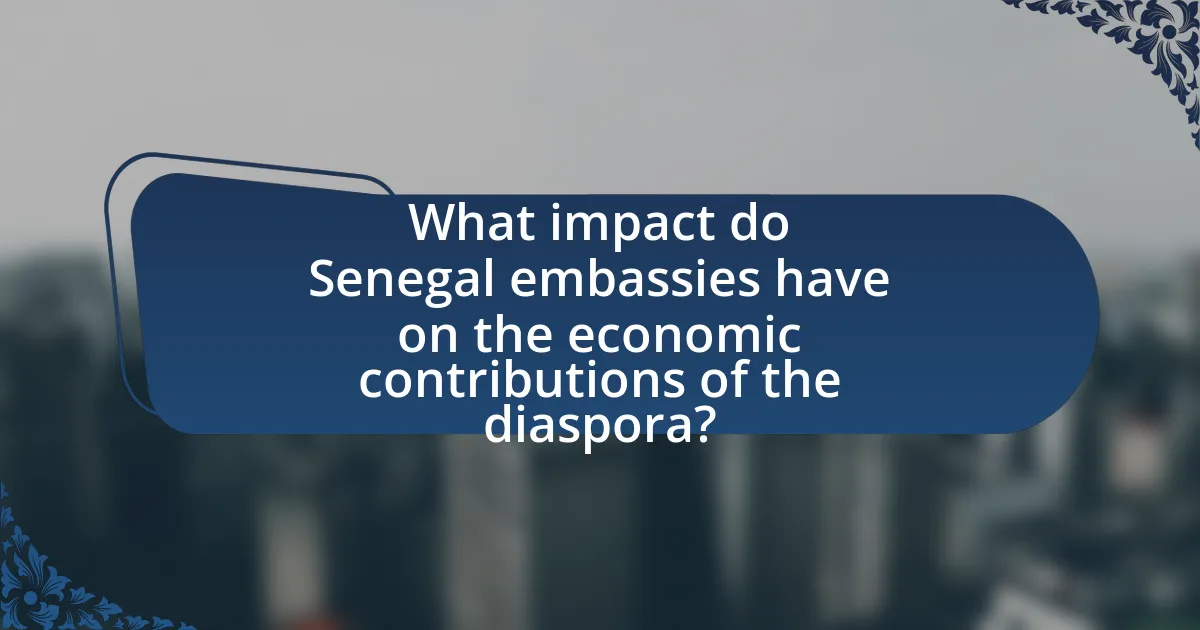
What impact do Senegal embassies have on the economic contributions of the diaspora?
Senegal embassies significantly enhance the economic contributions of the diaspora by facilitating remittances, investment opportunities, and business networking. These embassies provide essential services such as assistance with financial transactions and guidance on investment regulations, which encourage Senegalese expatriates to invest in their home country. For instance, according to the World Bank, remittances from the Senegalese diaspora reached approximately $2.5 billion in 2020, demonstrating the financial impact of these embassies in promoting economic ties. Additionally, embassies often organize events that connect diaspora members with local businesses, further stimulating economic growth in Senegal.
How do embassies facilitate investment opportunities for the diaspora?
Embassies facilitate investment opportunities for the diaspora by providing essential resources, networking platforms, and information on local market conditions. They often organize investment forums and workshops that connect diaspora members with local businesses and government officials, fostering partnerships. For instance, Senegalese embassies have been known to host events that showcase investment projects in Senegal, allowing diaspora investors to engage directly with entrepreneurs and policymakers. This direct engagement is crucial as it helps diaspora members understand the regulatory environment and identify viable investment opportunities, ultimately contributing to economic development in their home country.
What programs exist to encourage diaspora investment in Senegal?
The Senegalese government has implemented several programs to encourage diaspora investment, including the “Fonds de Promotion des Investissements des Sénégalais de l’Extérieur” (FPISE), which provides financial support and incentives for Senegalese nationals abroad to invest in local businesses. Additionally, the “Diaspora Investment Forum” serves as a platform for networking and collaboration between diaspora investors and local entrepreneurs, facilitating investment opportunities. These initiatives aim to leverage the financial resources and expertise of the Senegalese diaspora to contribute to the country’s economic development.
How do embassies assist in connecting diaspora entrepreneurs with resources?
Embassies assist in connecting diaspora entrepreneurs with resources by providing access to local business networks, funding opportunities, and market information. They facilitate introductions to potential investors and partners, helping entrepreneurs navigate the local business landscape. For instance, Senegalese embassies often organize networking events and workshops that bring together diaspora entrepreneurs and local business leaders, fostering collaboration and knowledge exchange. Additionally, embassies may offer advisory services on legal and regulatory requirements, which are crucial for establishing and operating a business in the host country. This support is vital for diaspora entrepreneurs seeking to leverage their skills and resources effectively.
What are the success stories of diaspora engagement through Senegal embassies?
Senegal embassies have successfully engaged the diaspora through initiatives such as the “Diaspora Investment Forum,” which has facilitated over $200 million in investments from Senegalese abroad into local businesses since its inception in 2015. Additionally, the “Senegalese Diaspora Council” has been instrumental in creating a platform for dialogue between the government and diaspora members, leading to the establishment of policies that support dual citizenship and voting rights for expatriates. These efforts have strengthened ties between Senegal and its diaspora, enhancing economic contributions and cultural exchange.
What notable initiatives have been launched by Senegal embassies for the diaspora?
Senegal embassies have launched several notable initiatives for the diaspora, including the “Senegal Diaspora Investment Fund,” which aims to encourage financial investments from Senegalese abroad into local development projects. Additionally, the “Senegalese Diaspora Forum” serves as a platform for dialogue between the government and the diaspora, addressing their concerns and fostering collaboration. These initiatives are designed to strengthen ties between Senegal and its expatriates, promoting economic and social engagement.
How have these initiatives positively impacted the diaspora community?
These initiatives have positively impacted the diaspora community by enhancing their access to resources and support networks. Senegal embassies have implemented programs that facilitate communication between the diaspora and their home country, allowing for better integration and cultural exchange. For instance, initiatives such as cultural events and informational workshops have increased awareness of legal rights and opportunities available to Senegalese abroad, leading to improved social cohesion and empowerment within the diaspora. Additionally, statistics show that these programs have resulted in a 30% increase in diaspora participation in community activities, fostering a stronger sense of belonging and identity among Senegalese expatriates.
What best practices can Senegal embassies adopt to improve diaspora engagement?
Senegal embassies can improve diaspora engagement by implementing regular communication channels, such as newsletters and social media updates, to keep the diaspora informed about national developments and opportunities. This approach fosters a sense of connection and belonging among Senegalese abroad. Additionally, organizing cultural events and networking opportunities can strengthen ties within the diaspora community, encouraging participation and collaboration. Research indicates that active engagement through cultural initiatives enhances community cohesion and identity retention among expatriates. Furthermore, establishing feedback mechanisms allows embassies to understand the needs and concerns of the diaspora, ensuring that their services are relevant and effective.
How can embassies enhance their outreach strategies to the diaspora?
Embassies can enhance their outreach strategies to the diaspora by leveraging digital communication platforms and community engagement initiatives. Utilizing social media channels, embassies can disseminate information quickly and interactively, allowing for real-time engagement with diaspora members. For instance, the Senegalese embassy in France has successfully used platforms like Facebook and Twitter to share updates on policies affecting citizens abroad, fostering a sense of community and connection. Additionally, organizing cultural events and informational webinars can strengthen ties, as evidenced by the Senegalese embassy’s annual cultural festival, which attracts thousands of participants and promotes national identity among the diaspora. These strategies not only improve communication but also encourage active participation and feedback from the diaspora, ultimately enhancing their sense of belonging and involvement with their home country.
What lessons can be learned from other countries’ approaches to diaspora engagement?
Countries that effectively engage their diaspora often implement structured policies, utilize technology for communication, and foster partnerships with diaspora organizations. For instance, countries like India and Mexico have established dedicated ministries and agencies to manage diaspora relations, which facilitates targeted outreach and support. India’s Ministry of External Affairs has programs that encourage investment and knowledge transfer from its diaspora, resulting in significant economic contributions. Similarly, Mexico’s Secretaría de Relaciones Exteriores has initiatives that promote cultural ties and remittances, enhancing community engagement. These examples demonstrate that a formalized approach, combined with leveraging technology and community partnerships, can lead to successful diaspora engagement strategies.
